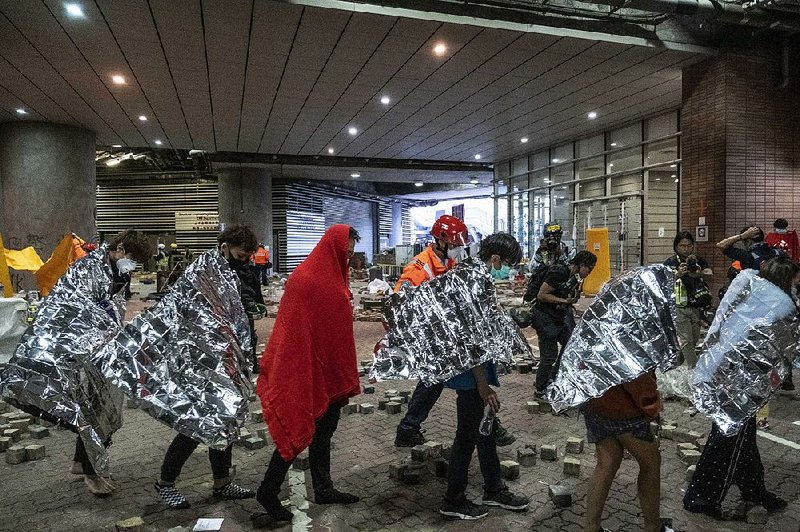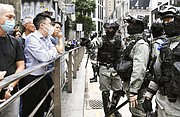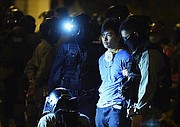HONG KONG -- Riot police surrounded a university campus with a handful of protesters remaining inside as Hong Kong's showdowns took a dramatic turn after a day marked by clashes, mass arrests and hundreds of injuries.
Hong Kong's police force said Tuesday that it had apprehended 1,100 people over the past day alone, as months of violent clashes appeared to reach something of a climax. It said many of the detainees would be charged with rioting and possession of offensive weapons.
It was the largest number of arrests and injuries on a single day since the protests began five months ago.
Meanwhile, Hong Kong faced a fresh threat to its tenuous freedoms and autonomy, as the Chinese government admonished the city's judiciary after a court overturned a ban on demonstrators' wearing face masks.
[Video not showing up above? Click here to watch » https://www.youtube.com/watch?v=33bGfwjc3v4]
The central government's Hong Kong affairs office said that Monday's judgment "blatantly challenged the authority" of China's legislature and of Chief Executive Carrie Lam, creating "severe negative social and political impact."
The remarks were perhaps the starkest and most public instance of Beijing's weighing in on a judicial decision in Hong Kong, which is guaranteed independent courts under the Basic Law, its mini-constitution.
The intervention underlined one of the central grievances of the protest movement -- perceived encroachment by the mainland government on the semiautonomous territory's affairs.
Concerns arose over the relative handful of protesters who have so far refused to leave the besieged campus of Hong Kong Polytechnic University, with authorities urging them to leave peacefully but refusing to rule out action to flush them out.
Those who remained at the campus were the last holdouts. They milled about in small groups and had boxes of homemade gasoline bombs, but the mood was grim in the trash-strewn plazas, in contrast to the excitement as the protesters prepared to take on police just a few days earlier.
One protester said he had no plan and was waiting for help. Another said he wanted to leave safely but without being charged. They would not give their full names, saying they feared arrest.
In a harbor-front promenade not far from the university, several hundred parents, teachers and sympathizers gathered for a peaceful, somber rally Tuesday evening, singing "Hallelujah" and waving cellphone lights in support of those remaining inside the university.
"We are thinking about the kids. We feel very strongly," said Maggie Lau, 50, a retiree, adding that she felt upset and hurt by what has happened. "Who can help our Hong Kong? I don't know. Hong Kong will disappear," she said.
U.N. human-rights spokesman Rupert Colville, speaking in Geneva, expressed concern about increasing violence by young people "who are clearly very angry, with deep-seated grievances."
But Colville, who speaks for the U.N. human-rights agency, also urged authorities to "address the humanitarian situation" of the remaining protesters holed up at the university.
After five months of street demonstrations calling for greater democracy and protesting what rights activists see as China's steady encroachment on Hong Kong's freedoms, the protests entered a new phase last week after a police officer shot a demonstrator.
Protesters moved en masse into five Hong Kong university campuses, turning them into fortresses and stockpiling gasoline bombs, catapults, bows and arrows, and even javelins. Most of the campuses were cleared by the weekend, with hundreds of protesters finally congregating at Polytechnic University.
[GALLERY: Protesters arrested as they run from Hong Kong campus » arkansasonline.com/1120hongkong/]
On Saturday, police began moving in, using tear gas and rubber bullets, and were met with rocks and Molotov cocktails. Finally, on Monday, the confrontation reached a climax.
Police said 800 demonstrators were apprehended as they left the besieged campus of their own accord overnight. Three hundred of them were younger than 18.
"Also, some rioters were seen escaping by [rappelling] off a footbridge to getaway vehicles below. Our officers gave chase and were able to interrupt 37 of them including the drivers," police spokesman Kwok Ka-chuen said at a news conference, adding that the drivers were arrested for assisting offenders.
Earlier, Lam, the chief executive, said that about 100 protesters remained inside the university and urged them to "put down the weapons and come out peacefully."
"If the protesters are coming out in a peaceful manner ... then there is no situation when that sort of violence would happen," she said at a news conference.
But police would have to take "necessary action" if the situation changed, Lam said, adding that she was shocked that campuses had been turned into "weapons factories."
Hospital authorities initially said 80 people arrived for treatment at facilities around the city after the clashes. First-aid teams then went inside the campus to provide on-site treatment and sent 200 people to hospitals for emergency care. They later updated the number of injured protesters to 354.
Six police officers also were reported to be injured.
The influx of patients put so much strain on the city's hospitals that patients with minor ailments were advised to seek help at general outpatient clinics or from private doctors.
A pro-democracy lawmaker, Ted Hui, entered the battered campus late Tuesday to try to persuade the remaining protesters to leave.
"The majority of them decided to leave after the discussion," he told media outlets before escorting a group out. "It was not because they wanted to leave or surrender, but they were exhausted and likely lacked water and food supplies. As I know, there are around 10 to 20 unwilling to leave."
Hui urged police not to storm the campus.
Another protester, also speaking on the condition of anonymity, said she escaped Tuesday afternoon by climbing over a hill and crossing two highways before being picked up by a volunteer driver.
She said morale was low after a tense face-off with police the night before, especially as the protesters ran out of food and other supplies.
"Many of the front-liners haven't slept, and many of us started to show signs of hypothermia," she said.
Throughout the day and evening Tuesday, some more protesters were seen trickling out, only to be arrested by police. Some were pinned to the ground by officers in riot gear, while others were taken away on gurneys.
Police had pledged that anyone under 18 would not face arrest: The names of those who left the campus were noted before they were released, but authorities did not rule out taking further action against them.
"We have not done any immediate arrests of these underage protesters," Lam said. "But of course we have to reserve the right to undertake further investigation in the future."
Hong Kong's new police chief, Chris Tang, said the purpose of the police operation was "only to maintain the law and public order."
Chinese propaganda organs continued Tuesday to urge Hong Kong authorities to forcefully quell the unrest. "Tolerance cannot reform the rioters. Restraint cannot stop the crimes," the Communist Party's official People's Daily newspaper said in a front-page editorial.
DEMOCRACY ACT
The U.S. Senate on Tuesday passed the Hong Kong Human Rights and Democracy Act by voice vote. It now goes to the U.S. House, which has already passed similar legislation.
The bill mandates sanctions on Chinese and Hong Kong officials who carry out human-rights abuses and require an annual review of the favorable trade status that Washington grants Hong Kong.
"The passage of this bill is an important step in holding accountable those Chinese and Hong Kong government officials responsible for Hong Kong's eroding autonomy and human-rights violations," said Sen. Marco Rubio, R-Fla., one of nearly 50 co-sponsors of the measure.
China has opposed all criticism of the handling of the Hong Kong protests as unwarranted interference in its domestic affairs. The government promised unspecified countermeasures in response to the passage of the House legislation last month.
Information for this article was contributed by Ken Moritsugu, Andi Jatmiko, Alice Fung, Dake Kang and staff members of The Associated Press; and by Tiffany Liang, Anna Kam, Casey Quackenbush, Gerry Shih, Shibani Mahtani, David Crawshaw, Simon Denyer and Ryan Ho Kilpatrick of The Washington Post.
A Section on 11/20/2019


